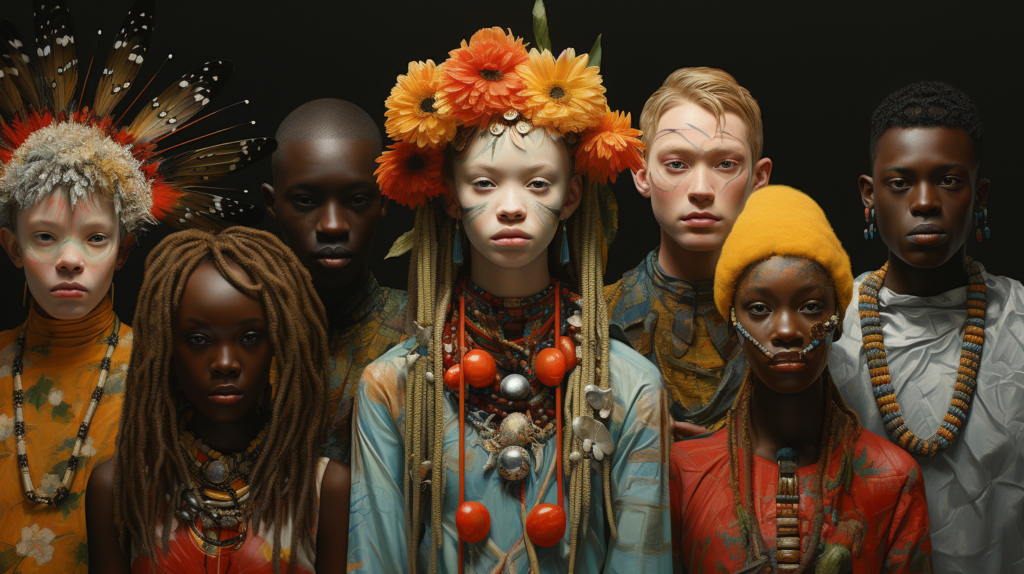Somewhere along our daily path of life, we come into contact with various cultures that differ from our own – whether near or far. We’re reminded of our humanity as we learn about these new ways of living, thinking, and feeling. But to really build meaningful connections and foster appreciation for cultural differences, there needs to be a greater understanding among us. Through this article, we’ll explore some ideas and resources that can help us take a renewed look at cultural understanding.
1. Understanding the Diversity of Cultures
Learning about the Different Cultural Paradigms
Cultural paradigms are the ways in which different societies interact with the world around them. Understanding the nuances of these paradigms is essential for any global citizen, as it helps one to understand the values and beliefs of different groups of people. Here are a few things to keep in mind when it comes to learning about the cultural paradigms of others:
- Look into the history and context of the culture
- Focus on understanding and appreciation, not judgement
- Make sure to respect the beliefs and practices of the culture
The best way to learn about different cultures is to take the time to actually immerse oneself in that culture. This could mean travelling to another country, talking to people from another culture, or even reading about other cultures. By doing so, you can gain a better understanding of the practices and values of the culture, and even come to respect the customs of the people. A bit of empathy and understanding goes a long way when it comes to being a global citizen.

2. The Impact of Cultural Values
Cultural values have far-reaching implications for social and personal life. They are embedded within every aspect of our lives and influence the decisions we make, the way we think, and the relationships we create. It is essential to understand the implications of cultural values as they are passed down across generations, forming our beliefs and shaping our behavior.
The influence of cultural values can be seen in the areas of communication, morality, and societal norms. In terms of communication, cultural values dictate how people communicate with each other and form the basis for societal views, such as approved methods of expressing emotions and appropriate language. In terms of morality, cultural values mold our sense of right and wrong and form our understanding of the difference between good and bad. In terms of societal norms, cultural values shape what is acceptable behavior and help form the basis for how societies operate.
Cultural values, therefore, have an essential role in determining our behaviors, how we communicate, and the moral compass by which we conduct ourselves. To shift or evolve our beliefs, we must understand the foundations of our cultural values and appreciate the power that our culture has on our lives:
- Cultural exchange: exchange of cultural values between different people, groups, and societies, and how those values get integrated into each other’s lives.
- Interconnection of beliefs: how our cultural beliefs interact and overlap to form shared opinions and attitudes.
- Independence vs. conformity: the balance between individual obedience and respect for shared values, as well as the importance of maintaining autonomy.
By increasing our understanding of cultural values, we can more effectively address the challenges faced by different societies and cultures today. Through informed dialogues, we can seek mutual understanding and appreciation of these values, and ultimately create cohesive and successful communities.
3. Perception of Cultural Behaviors
Cultural behavior means a group of beliefs, ideas, or values that are shared among a group of people. Understanding cultural behaviors provides a foundation for improved communication and understanding among different cultures. begins with an awareness of how our own beliefs, values, and opinions influence how we perceive the beliefs, values, and opinions of others.
Our experience with different people inevitably shapes how we perceive their behavior and customs. It is important to keep an open mind, free of judgment, when first engaging with people of other cultural backgrounds. Ask questions to gain an understanding, and be respectful of the other person. can be improved further by educating oneself of the beliefs, values, and customs of others.
By taking the time to learn more about other cultural behaviors, there are many positive outcomes, such as:
- An appreciation and respect for different cultures.
- Improved communication and engagement.
- Ability to articulate and evaluate ideas and opinions.
- Greater insight into different perspectives.
Educating oneself on different cultural behaviors can be fun and inspiring. It creates a better understanding of other people which can lead to a better understanding of ourselves as well.

4. Examining Cultural Stereotypes
The examination of cultural stereotypes is an ongoing and ever-important issue. Stereotypes are far too often used as a tool of oppression of marginalized and oppressed people. By , we can hope to combat and ultimately eliminate this form of discrimination.
In order to do meaningfully examine cultural stereotypes, it is essential to examine them in terms of both their origins and their impact. Too often these stereotypes have been created and maintained by those in power, for example, with the objective of maintaining the status quo and keeping certain people in a position of advantage while subjugating those deemed ‘lesser’.
It is also important to look at how these stereotypes shape people’s behaviour towards members of the specific group in question. Unspoken expectations and attitudes can be created in the context of a stereotype, which can have an adverse and damaging effect on members of that group. For example, stereotypes relating to women can be based upon outdated and disempowering ideals, which can make it harder for them to get ahead in life.
5. Appreciating Cultural Differences
Diverse cultures are an interesting experience for everyone. It is something that needs to be appreciated so that we can grow closer and promote peace. Here are 5 ways to appreciate cultures different than yours:
- Investigate the details. Get to know the deeper facets of the culture like the customs and history. This insight can be found from reading online blogs, books, and asking locals.
- Be open-minded and accepting without judgment. Accept people from cultures that are unfamiliar to you without prejudice and stay away from quick judgments.
- Join different cultural activities. Observe and participate in festivals, parades, shows, and more.
- Listen with an open heart. Make a genuine effort to understand the views, experience and feelings of people from different cultures.
- Travel and explore. Immerse yourself in the different cultures around the world. Consider the beauty and learning opportunities in visiting different places.
is one of the most powerful things a person can do. It will lead to mutual understanding, respect and cultural preservation. Embrace it and learn from it; it can be a powerful tool towards connectedness and collaboration.
By accepting, understanding, and engaging with different cultures, we show our willingness to learn from them and bring different perspectives. Whether it be for personal development or professional growth, there is no limit to what we can gain by opening our minds to different cultures.

6. Sources of Cultural Understanding
Cultural Understanding: 6 Sources
The ability to understand and appreciate different cultures has been recognized as an essential skill for a successful global career. Cultures around the world vary dramatically, so having a strong knowledge base of how to approach different cultures can be the key to success in your cultural understanding. Here are 6 great sources to help you build that understanding.
- Books and Articles: There’s an incredible range of books and articles on the topic. Reading up on the customs and beliefs of different cultures is a great way to start building your cultural understanding and wisdom.
- Local Observations: One of the most effective tools for learning about cultures is to observe people in their local environment. Whether its noticing the way people dress, interact, or worship in public or just hanging out in different parts of town, you can really get an innovative insight into a culture.
- Conversations: Engaging in conversations with people from other cultures is a great way to get immersed in their world view and gain firsthand experience. Exploring customs, languages, and beliefs through dialogue with someone can illuminate cultural boundaries and overcome potential language barriers.
- Cultural Spaces and Events: Participating in cultural spaces and events is an effective way to absorb knowledge and information from a particular culture and get a better understanding. Visiting markets, restaurants, and galleries from a particular culture gives you a direct window into the vibrancy of that culture.
- Local Cuisine: Trying different types of cuisine from different cultures is an all-encompassing experience. Not only is it great to get to taste all the amazing foods other cultures have to offer, but it also gives you a great opportunity to learn more about the history and culture of those respective countries.
- Travel: Arguably one of the most effective and enjoyable tools for cultural understanding is to travel the world. Seeing different places and experiencing different cultures in their native settings allows you to truly understand them.
Cultural understanding is an essential skill for global success. With many sources of information available, it is easier than ever to expand your knowledge. Be sure to explore all the tools you have available to gain a better understanding of different cultures. With this knowledge and understanding, you can be sure to reach new cultural heights.
7. Overcoming Prejudice and Bias
It’s true that prejudice and bias continue to plague society, leading to blind anger and hate, and often affecting some more than others. But considering how far humanity has come, it’s impressive how quickly that tide has been turned. Here are some tips in becoming more aware and helpful in towards others.
- One of the first steps is to reflect on your own thoughts and behavior towards certain groups, and then strive to be more respectful and positive to each and every one of them.
- The next step is to acknowledge and confront any negative stereotypes that have been pre-programmed within you. Make sure to erase these discriminatory thoughts and replace them with ones that express respect.
- Finally, it’s important to actively speak out against prejudice or unjust behavior if you witness it. Otherwise you at best condone, and at worst, contribute to the problem.
Accepting people for who they are and not based on some preconceived notion is the only way to truly eliminate prejudice and bias. We all have lots to learn to be more knowledgeable and open-minded towards those with a different background than us, so take the initiative to do so, and be a champion of positive change!

8. Bridging Cultural Gaps
Interacting with people from other cultures can be difficult. From tiny differences in etiquette to much larger social issues, cultural gaps can create challenges for those who do business across different nations. Despite this, is an important part of international interactions and can be achieved with some helpful strategies.
Developing Cultural Awareness – Understanding how local customs and cultural mores are different from your own is a key step in . This involves understanding the values of the nation with which you’re working, understanding differences in language, and learning about laws and courtesies. By becoming aware of these issues, you can adjust your communication and interactions accordingly.
Developing Respect – It is important to foster mutual respect. Respect for the beliefs and ideas of those from other cultures is essential for success in . Unfamiliar cultures may have different customs or beliefs than your own, and it is important to recognize that these differences should be respected. This also means understanding when certain topics or behaviors are off-limit, as well as recognizing when there are communication challenges.
- Listen and be empathetic to differing opinions
- Resist the urge to interject criticism
- Pay attention to body language and other non-verbal cues
- Work to understand the cultural context of conversations
Remaining Open-Minded – Maintaining an open-mind is essential when attempting to bridge cultural gaps. This means being willing to learn and adjust, as well as being open to changing your own beliefs and values. Keeping an open-mind will not only help you to better understand the people you’re dealing with, but can even lead to surprising and unexpected opportunities.
9. Building Cultural Connections
The increasingly open and expansive world today is also pushing cultural boundaries. Connections between people and cultures have become easier, and the importance of finding a common thread between them has become increasingly necessary. Creating strong cultural connections need not be a tiresome exercise, nor should it lead to any conflicts. Let us look at some ways we can form meaningful cultural connections.
- Leveraging global communities – There are various global communities that are working to bring people together from different backgrounds. Participating in such group activities and dialogs is a great way to bridge cultural gaps, promote understanding and make connections.
- Women empowerment – Women from all over the world have become activists for their rights and social change. It is important to promote and encourage their endeavors, as such actions create cross-cultural bonds and support global progress.
- Participate in international events – There many international events, festivals or celebrations that provide a platform for different cultures to come together and share in the joys of a common cultural history.
Communicating through the internet also allows us to pick up cultural nuances and express our insights in ways that were hard to imagine before. It is even possible to create virtual communities for people to learn from each other, share stories and build meaningful cultural connections.
should be seen as an opportunity, not a source of conflict. By consciously working towards mutual understanding and a shared cultural bridge, we can find ways to create meaningful connections with people from around the world.
10. Celebrating Cultural Diversity
Cultural diversity is the co-existence of different cultures in a particular space. As human beings, we must learn to celebrate the cultural differences around the globe despite the occasional conflicts they may bring. Here are some things to keep in mind when celebrating our differences:
- Prioritize Open-Mindedness – Have a genuine interest in embracing cultures foreign to us. Understanding and respecting different cultures could open up conversations to better comprehension and mutual understanding.
- Respect and Celebrate Diversity – Celebrate different festivities and cultural customs of other ethnicities. This is how we should show our appreciation and recognition towards the diversity of cultures.
Diversity is more than what it appears to be. It isn’t limited to just music, food, and language; it includes our values, beliefs, and perspectives. Being open-minded and respectful towards every culture is the starting point to overcoming cultural differences. Allowing each other to be ourselves and celebrating each other’s differences will promote a much promising future.
There is much to be gained from exploring sources of cultural understanding. From truly connecting with another culture, comes a deeper appreciation of our shared humanity and a greater capability to build relationships and promote global understanding. As we learn from one another and our rich cultural heritage, we expand our own potential to create a world of acceptance and inclusion.
